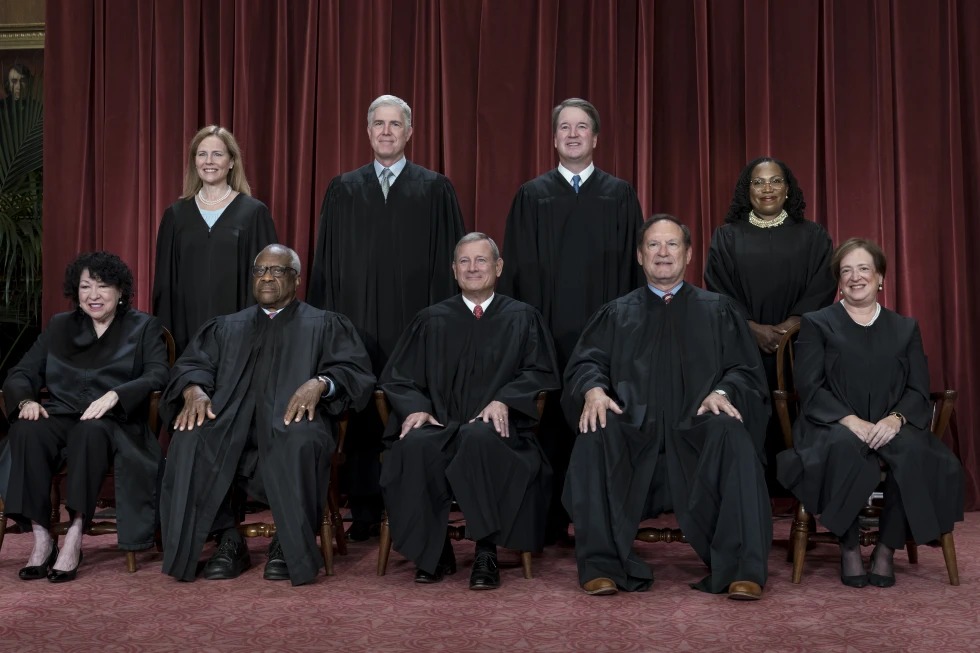As losses mount in lower federal courts, President Donald Trump has returned to a tactic that he employed at the Supreme Court with remarkable success in his first term.
Three times in the past week, and six since Trump took office a little more than two months ago, the Justice Department has asked the conservative-majority high court to step into cases much earlier than usual.
The administration’s use of the emergency appeals, or shadow docket, comes as it faces more than 130 lawsuits over the Republican president’s flurry of executive orders. Many of the lawsuits have been filed in liberal-leaning parts of the country as the court system becomes ground zero for pushback to his policies.
Federal judges have ruled against the administration more than 40 times, issuing temporary restraining orders and preliminary injunctions, the Justice Department said Friday in a Supreme Court filing. The issues include birthright citizenship changes, federal spending, transgender rights and deportations under a rarely used 18th-century law.
The administration is increasingly asking the Supreme Court, which Trump helped shape by nominating three justices, to step in, not only to rule in its favor but also to send a message to federal judges, who Trump and his allies claim are overstepping their authority.
“Only this Court can stop rule-by-TRO from further upending the separation of powers — the sooner, the better,” acting Solicitor General Sarah Harris wrote Friday in the deportations case, referring to the temporary restraining orders.
Stephen Vladeck, the Georgetown University law professor who chronicled the rise of emergency appeals in his book, “The Shadow Docket,” wrote on the Substack platform that “these cases, especially together, reflect the inevitable reckoning — just how much is the Supreme Court going to stand up to Trump?”
In the first Trump administration, the Justice Department made emergency appeals to the Supreme Court 41 times and won all or part of what it wanted in 28 cases, Vladeck found.
Before that, the Obama and George W. Bush administrations asked the court for emergency relief in just eight cases over 16 years.
Supreme Court cases generally unfold over many months. Emergency action more often occurs over weeks, or even a few days, with truncated briefing and decisions that are usually issued without the elaborate legal reasoning that typically accompanies high court rulings.
So far this year, the justices have effectively sidestepped the administration’s requests. But that could get harder as the number of appeals increase, including in high-profile deportation cases where an extraordinary call from the president to impeach a judge prompted a rare rebuke from Chief Justice John Roberts.
Immigration and the promise of mass deportations were at the center of Trump’s winning presidential campaign, and earlier this month, he took the rare step of invoking an 18th-century wartime law to speed deportations of Venezuelan migrants accused of belonging to the Tren de Aragua gang.
Lawyers for the migrants, several of whom say they are not gang members, sued to block the deportations without due process.
U.S. District Judge James E. Boasberg, the chief judge at the federal courthouse in Washington, agreed. He ordered deportation flights to be temporarily halted and planes already making their way to a prison in El Salvador be turned around.
Two planes still landed, and a court fight over whether the administration defied his order continued to play out even as the administration unsuccessfully asked the appeals court in the nation’s capital to lift his order.
In an appeal to the Supreme Court filed Friday, the Justice Department argued that the deportations should be allowed to resume and that the migrants should make their case in a federal court in Texas, where they are being detained.
Thousands of federal workers have been let go as the Trump administration seeks to dramatically downsize the federal government.
The firings of probationary workers, who usually have less time on the job and fewer protections, have drawn multiple lawsuits.
Two judges have found the administration broke federal laws in its handling of the layoffs and ordered workers reinstated. The government went to the Supreme Court after a California-based judge said some 16,000 workers must be restored to their positions.
The judge said it appeared the administration had lied in its reasons for firing the workers. The administration said he overstepped his authority by trying to force hiring and firing decisions on the executive branch.
Trump has moved quickly to try and root out diversity, equity and inclusion programs across the government and in education.
Eight Democratic-led states argued in a lawsuit that the push was at the root of a decision to cut hundreds of millions of dollars for teacher training.
A federal judge in Boston has temporarily blocked the cuts, finding they were already affecting training programs aimed at addressing a nationwide teacher shortage. After an appeals court kept that order in place, the Justice Department went to the Supreme Court.
The administration argues that judges can’t force it to keep paying out money that it has decided to cancel.
On Inauguration Day, Trump signed an executive order that, going forward, would deny citizenship to babies born to parents in the country illegally.
The order restricting the right enshrined in the Constitution was quickly blocked nationwide. Three appeals court also rejected pleas to let it go into effect while lawsuits play out.
The Justice Department didn’t appeal to the Supreme Court to overturn those rulings right away, but instead asked the justices to narrow the court orders to only the people who filed the lawsuits.
The government argued that individual judges lack the power to give nationwide effect to their rulings, touching on a legal issue that’s concerned some justices before.
___
Republished with permission of the Associated Press.
Post Views: 0

 Entertainment8 years ago
Entertainment8 years ago
 Politics8 years ago
Politics8 years ago
 Entertainment8 years ago
Entertainment8 years ago
 Entertainment8 years ago
Entertainment8 years ago
 Tech8 years ago
Tech8 years ago
 Tech8 years ago
Tech8 years ago
 Politics8 years ago
Politics8 years ago
 Tech8 years ago
Tech8 years ago










